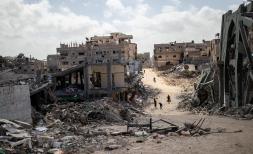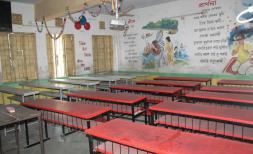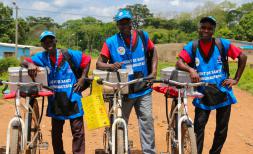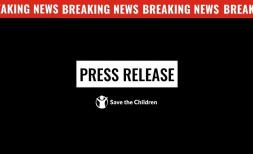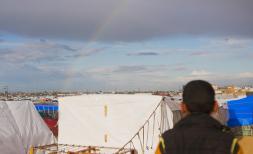Stress, fear and anxiety for mothers and newborns in Ukraine as more than 900 babies born every day during 9 months of war – Save the Children
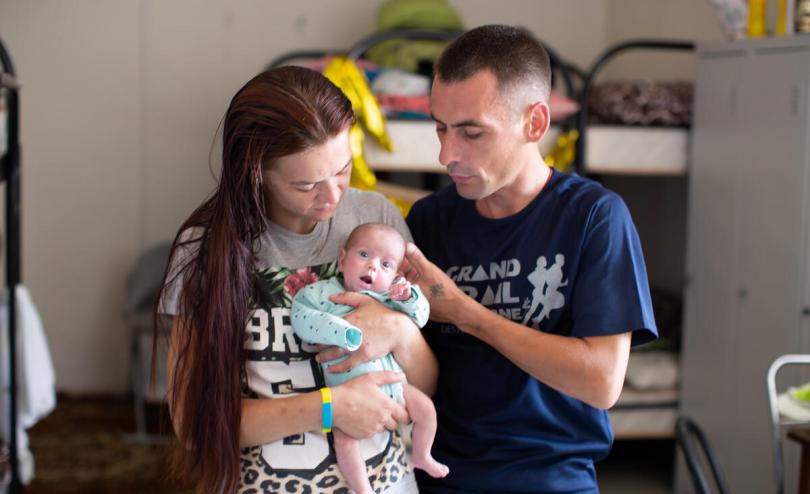
Antonina * and Andriy* with their baby premature Ganna* in a collective centre in eastern Ukraine
KYIV 23 November – More than 900 babies are estimated to have been born every day since the deadly war in Ukraine escalated nine months ago, according to Save the Children, with the consequences of the conflict taking a serious toll on the health of mothers and their newborns.
New analysis by the aid organisation, using data from the UN population prospects, reveals that an estimated 247,440 infants–or an average of 903 babies a day–were born since 24 February to women who were living in Ukraine when the war escalated nine months ago.
The analysis comes as the country’s health care system is under immense pressure after nine months of war, imperiling the lives of hundreds of thousands of infants and new and expectant mothers with limited access to medical care, particularly in areas of active conflict.
In the nine months of war, urban areas across Ukraine have been repeatedly shelled, with at least 703 attacks on health infrastructure. In southern Ukraine, missiles reportedly hit a maternity ward on Tuesday night, killing a two-day-old baby and injuring two doctors. Since the war escalated, at least 1,170 children have been killed or injured in Ukraine, according to verified UN data.
“An average of about 900 children a day are being born into a life of uncertainty. The chaos of the war poses a serious threat to these mothers and newborns,” said Sonia Khush, Save the Children’s Country Director in Ukraine. “We’re hearing accounts of women who’ve gone into labour early because of their constant state of stress and fear.”
“At the start of the war, many pregnant women were forced to give birth in basements or bunkers. Now, we’re seeing women give birth in overwhelmed hospitals, away from family members, and in countries hosting refugees from Ukraine. Even though there are fewer women giving birth in bunkers compared to earlier this year, their pregnancies are still just as stressful,” Khush added.
High levels of stress and anxiety during pregnancy may affect a baby's brain development or immune system and can lead to preterm birth or even miscarriage. A recent study in the journal Infancy also found that babies exposed to more fluctuations in stress during pregnancy showed more fear, sadness and distress at 3-months than those of mothers who were less stressed.
Antonina*, 27, was 30-weeks pregnant when she fled fighting in Donetsk Oblast with her husband, Andriy*, 36, on 10 May. The couple sought refuge in Dnipro where Antonina gave birth two days later to a premature baby girl with severe health complications.
“The war added an immense amount of stress to my pregnancy. I couldn’t sleep with the constant sound of fighting and fear that something may happen to my family. I was so stressed that I ended up getting high blood pressure. I knew there was something seriously wrong but we were living in an area with no doctors who could help, so we had to leave,” said Antonina. “If it wasn’t for the war, I don’t think I would have had such a stressful pregnancy.”
Andriy lost his job almost immediately after the war escalated in February, adding immense pressure to both him and Antonina as they eagerly awaited the birth of their daughter, Ganna*.
Due to stress and anxiety, Antonina needed to have an emergency caesarean section about 10-weeks before her due date. Ganna was born with a compromised immune system, and now requires an inhaler three times a day and will be on medication for the next three years.
“Due to all the complications of the pregnancy, we spent several weeks in the hospital. We couldn’t even go outside because of my baby’s immune system and her respiratory complications,” said Antonina.
Although the family now lives in Dnipro, a large city situated in eastern Ukraine, Andriy is still unable to find a job, making it difficult for them to afford Ganna’s medication.
“Andriy is still without work. Since we’re displaced from Donetsk, no one wants to hire him. They only want locals from Dnipro. Andriy is an electrician and a builder, he can do work but just can’t find a job,” said Antonina. “We have no extended family. It is just us. The only plan we have is to raise a healthy child.”
Due to the family’s financial situation, they are living in a collective centre with about 280 others who fled fighting in parts of eastern and southern Ukraine.
Save the Children is supporting displaced families in Dnipro like Antonina’s by providing mattresses and clean water to collective centres. The aid organisation is also providing cash assistance to vulnerable families in Ukraine so they can purchase much needed items, such as clothes, medication and food. In western Ukraine, Save the Children is training health workers on breastfeeding practices.
With the help of local partners, Save the Children is providing shelter, food, cash, fuel, psychological support, and baby and hygiene kits to displaced families.
ENDS
Notes to Editor:
Based on UN data published in its World Population Prospects, an estimated 329,620 births are expected in Ukraine in 2022 and therefore 247,440 births during the 274 days since the war escalated on 24 February (274/365*329,620). This equals to approximately 903 babies a day. Due to the high volume of people fleeing Ukraine since 24 February, many of these babies were likely born in countries hosting displaced women from Ukraine.
Save the Children has been operating in Ukraine since 2014, delivering humanitarian aid to children and their families. It is now supporting refugee families across Europe and helping children to get access to the services they need.
Between Feb. 24 and Nov. 21, the UN has verified that 1,170 children have been killed or injured in the war, with 415 children killed and 755 injured: Ukraine: civilian casualty update 21 November 2022 | OHCHR
We have multimedia content for this release, available here: https://www.contenthubsavethechildren.org/Share/js83677n85xl44lf6p6n33lf3576x3fp
*******************************************************************************************************************
For further enquiries please contact:
Samantha Halyk, acting Head of Global News, Samantha.halyk@savethechildren.org (based in London)
Randa Ghazy, Regional Media Manager, Randa.ghazy@savethechildren.org (based in London)
Our media out-of-hours (GMT) contact is media@savethechildren.org.uk / +44(0)7831 650409
We have spokespeople available in Ukraine.
